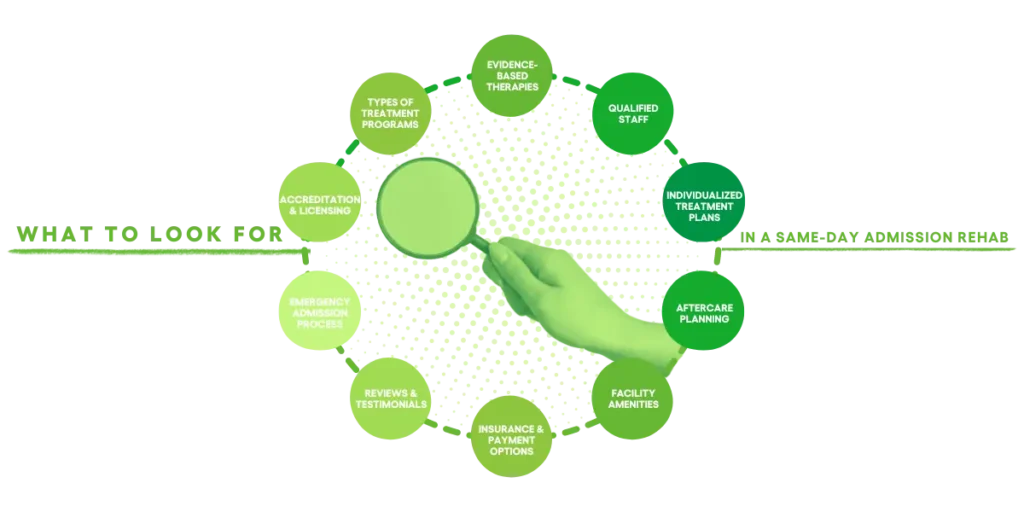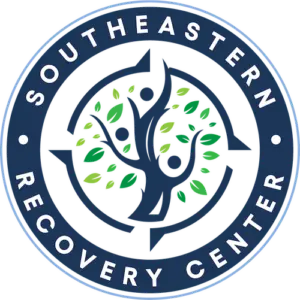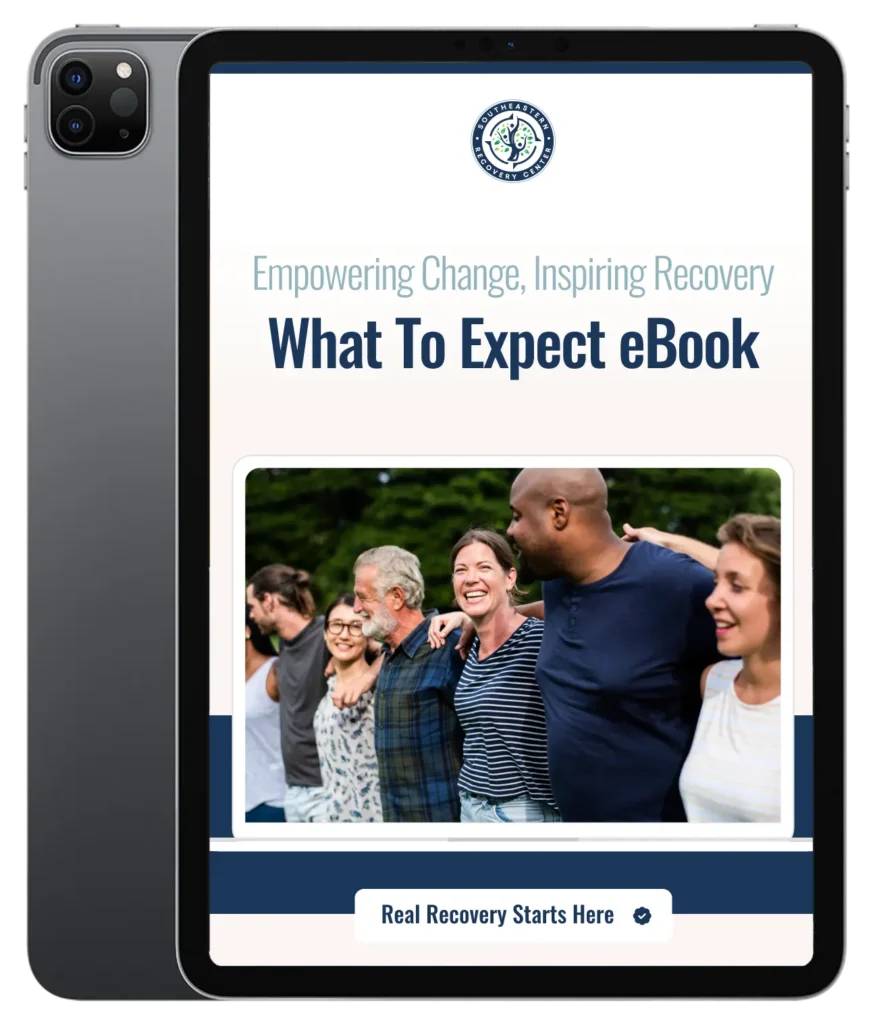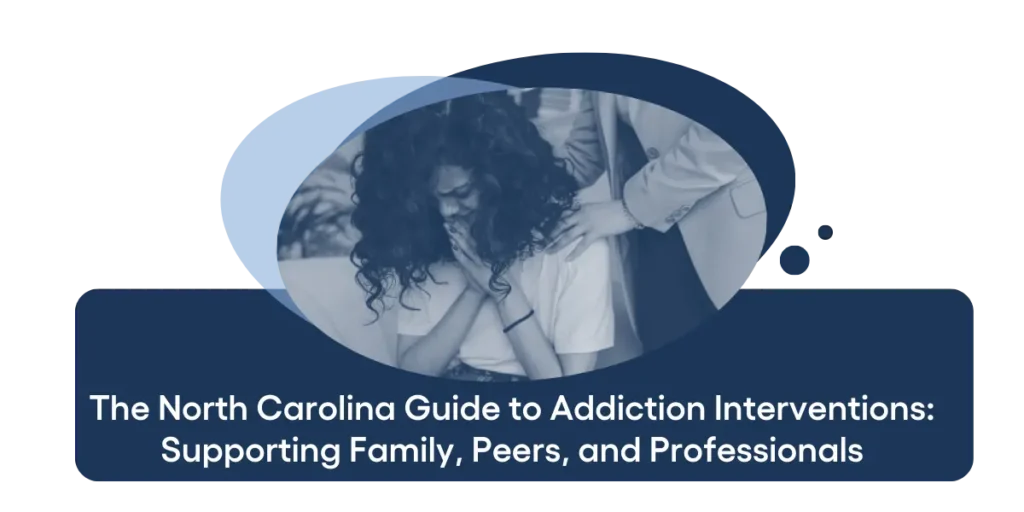
Criteria for choosing a “same day admission rehab near me”:
- Accreditation and Licensing
- Types of Treatment Programs
- Evidence-Based Therapies
- Staff Qualifications
- Individualized Treatment Plans
- Aftercare Planning
- Facility Amenities
- Insurance and Payment Options
- Location and Accessibility
- Reviews and Testimonials
- Family Involvement
- Emergency Admission Process
When the need for immediate rehab treatment arises, knowing what to look for can make a significant difference in the outcome of your recovery journey. The search for “same day admission rehab near me” can be overwhelming, but focusing on key factors can help you make an informed decision. In 2022, there were 17,353 substance abuse treatment centers across the country – and that number is rising every year. This guide will outline the critical aspects to consider ensuring you choose a facility that meets your needs and sets you on the path to recovery.
1. Accreditation and Licensing
The first step in choosing a rehab center is verifying its accreditation and licensing. Accredited facilities meet specific standards of care and are regularly reviewed to ensure they provide quality treatment. Look for certifications from reputable organizations such as the Joint Commission, CARF (Commission on Accreditation of Rehabilitation Facilities), or state-specific licenses. These accreditations indicate that the facility adheres to high standards in treatment and patient care.
Here are the key accreditations and licenses to look for:
- Joint Commission (JCAHO): The Joint Commission is a nonprofit organization that accredits and certifies healthcare organizations and programs in the United States. Facilities accredited by the Joint Commission meet rigorous performance standards in providing safe and effective care. It is a widely recognized and respected accreditation in the healthcare industry.
- Commission on Accreditation of Rehabilitation Facilities (CARF): CARF is an independent, nonprofit accreditor of health and human services, including addiction treatment programs. CARF accreditation signifies that the facility has met high standards for service and quality in addiction treatment. CARF-accredited facilities are committed to continuous improvement and consumer-focused programs.
- American Society of Addiction Medicine (ASAM) Certification: ASAM provides certification for physicians and addiction specialists. Facilities employing ASAM-certified professionals are likely to follow evidence-based practices and maintain high standards of care in addiction treatment.
- National Association of Addiction Treatment Providers (NAATP) Membership: NAATP is a professional organization that represents addiction treatment providers. Membership in NAATP indicates a commitment to ethical practices, professional development, and adherence to industry standards.
Many states require specific licenses for facilities providing substance abuse treatment, which may be issued by the state’s health department or a dedicated substance abuse treatment oversight body.
2. Types of Treatment Programs
Different rehab centers offer various treatment programs. It’s essential to find one that provides the type of care you need. Common treatment programs include:
Detoxification
Detoxification is the first step in addiction treatment, focused on removing toxic substances from the body. It involves medical supervision to ensure safety and manage withdrawal symptoms. Healthcare professionals monitor vital signs, administer medications, and provide immediate care for complications. The aim is to stabilize the patient physically and mentally, preparing them for further treatment. Detox programs are tailored to the type of substance used, duration of use, overall health, and co-occurring mental health disorders.
Inpatient/Residential Treatment
Inpatient or residential treatment provides a structured environment where patients live at the facility. It offers continuous support from healthcare professionals around the clock. Daily schedules include therapy sessions, educational workshops, physical activities, and recreational therapy. Inpatient programs also address the physical, emotional, and psychological aspects of addiction through therapies such as yoga, meditation, and nutritional counseling.
Outpatient Treatment
Outpatient treatment allows individuals to live at home while attending treatment sessions. This option suits those with less severe addictions or as a follow-up to inpatient care. Outpatient programs vary in intensity, offering individual counseling, group therapy, family therapy, and educational sessions. The focus is on developing coping skills, preventing relapse, and building a support network. Patients can apply skills learned in therapy to real-world situations.
Partial Hospitalization Programs (PHP)
Partial Hospitalization Programs (PHP) provide intensive therapy during the day, allowing patients to return home in the evening. PHPs offer a comprehensive schedule of therapeutic activities, including individual and group therapy, family therapy, and psychoeducation. This structured environment helps patients develop routines and engage in productive activities. PHPs offer the flexibility of living at home while receiving intensive care.

3. Evidence-Based Therapies
Effective rehab centers use evidence-based therapies proven to help individuals recover from addiction. Look for facilities that offer Cognitive Behavioral Therapy (CBT), which helps patients identify and change negative thought patterns and behaviors. Dialectical Behavior Therapy (DBT) focuses on teaching coping skills to manage stress and emotional regulation. Motivational Interviewing enhances a patient’s motivation to change. Medication-Assisted Treatment (MAT) combines medication with therapy to treat substance use disorders, particularly useful for opioid and alcohol addictions.
CBT can be a beneficial treatment option for co-occurring disorders. It can be used alone or with other therapies and helps with managing symptoms and reducing the risk of relapse.
4. Qualified Staff
When choosing a rehab facility, the qualifications and expertise of the staff are crucial to ensuring high-quality care and successful recovery. Look for facilities with a multidisciplinary team of licensed and experienced professionals. Key staff members should include addiction-certified doctors who specialize in addiction medicine and can provide comprehensive medical care. Nurses trained in handling detox and withdrawal symptoms are essential for patient safety during the detoxification process.
Therapists should be licensed in addiction counseling and therapy, bringing a wealth of knowledge in evidence-based treatment methods such as Cognitive Behavioral Therapy (CBT) and Dialectical Behavior Therapy (DBT). Psychiatrists are vital for addressing any co-occurring mental health disorders, providing dual diagnosis treatment when necessary.
It’s also important to find facilities where staff members engage in continuous education and professional development to stay updated with the latest advancements in addiction treatment. A compassionate and supportive approach from the staff can significantly impact the patient’s comfort and willingness to engage in therapy. Look for a rehab center where the staff demonstrates empathy, understanding, and a genuine commitment to helping patients achieve long-term recovery. A well-qualified and dedicated team can make all the difference in the effectiveness of the treatment program.
5. Individualized Treatment Plans
Individualized treatment plans are crucial for effective addiction recovery, as they address the unique needs and circumstances of each patient. These plans begin with a comprehensive assessment that considers the type of substance used, the duration and severity of the addiction, overall health, and any co-occurring mental health conditions. By tailoring the treatment approach, rehab centers can provide targeted therapies that are more likely to be effective.
An individualized plan may include a combination of detoxification, therapy sessions (both individual and group), medication-assisted treatment (MAT), and holistic therapies like yoga or meditation. It also adjusts as the patient progresses, ensuring that the treatment evolves with their changing needs. This personalized approach enhances the likelihood of long-term recovery by addressing specific triggers, building coping strategies, and fostering a supportive environment tailored to the patient’s journey.
A custom-fit plan provides the best foundation for lasting sobriety and overall well-being.
6. Aftercare Planning
Aftercare planning is a critical component of successful addiction recovery, ensuring that patients maintain their sobriety and continue to progress after leaving the rehab facility. Effective aftercare plans are tailored to the individual’s needs and typically include ongoing therapy sessions, support group participation, and regular check-ins with counselors or case managers. These elements help reinforce the coping strategies and skills learned during treatment.
Additionally, aftercare plans might involve practical support such as assistance with finding employment, housing, or educational opportunities. They often include relapse prevention strategies, such as identifying triggers and developing a plan to manage them. Sober living arrangements or transitional housing can provide a supportive environment for those who need it.
By providing a structured plan for the weeks and months following treatment, aftercare planning helps individuals transition smoothly back into daily life, reducing the risk of relapse and promoting long-term recovery and stability.
7. Facility Amenities
While the primary focus should be on the quality of care, the amenities offered can also impact your comfort and overall experience. Some amenities to consider include:
Comfortable Living Accommodations: Comfortable living accommodations are essential in a rehab facility, as they contribute significantly to a patient’s overall comfort and sense of security. Look for centers offering private or shared rooms, allowing for privacy or peer support based on individual preferences. The environment should be clean and well-maintained, providing a safe and peaceful space conducive to recovery. Additionally, amenities such as common areas for relaxation, outdoor spaces, and quiet areas for reflection or reading can enhance the living experience.
Recreational Activities: Recreational activities are an important aspect of a holistic approach to recovery. Facilities should offer a variety of options to cater to different interests and needs. This might include access to a gym for physical fitness, yoga and meditation classes for mental and emotional well-being, and art therapy for creative expression and stress relief. Outdoor activities, such as hiking, gardening, or team sports, can also provide therapeutic benefits and promote a healthy lifestyle.
Nutritional Support: Proper nutrition plays a vital role in the recovery process. Rehab centers should provide healthy meal options that cater to various dietary needs and preferences. Look for facilities that offer balanced, nutritious meals designed to support physical health and healing. Dietary accommodations should be available for those with specific requirements, such as vegetarian, vegan, gluten-free, or allergy-friendly options. Nutrition education and counseling may also be part of the program, helping patients understand the importance of healthy eating habits.
Holistic Therapies: Holistic therapies are complementary treatments that address the whole person—mind, body, and spirit. These therapies can enhance traditional addiction treatments by promoting overall well-being. Massage therapy can help reduce stress and physical tension, while acupuncture may alleviate withdrawal symptoms and promote relaxation. Spiritual counseling offers support for those seeking a deeper connection or exploring their spiritual beliefs as part of their recovery journey. Other holistic options might include mindfulness practices, tai chi, or aromatherapy, all aimed at supporting the healing process.
8. Insurance and Payment Options
Rehab can be expensive, so it’s essential to understand your payment options. Ensuring you have a clear picture of the financial commitments involved can help you manage costs effectively and avoid unexpected expenses. Many same day admission rehab facilities offer free insurance verification online.
According to the National Center for Drug Abuse Statistics, the average cost of an outpatient rehab program in the United States costs approximately $5,000 for a three-month program.
Here are some key aspects to consider:
Insurance Coverage
First, check if the facility accepts your insurance and what costs are covered. Contact your insurance provider to understand the extent of your coverage for addiction treatment services, including detox, inpatient or outpatient care, and any additional therapies. Knowing your insurance benefits can significantly reduce out-of-pocket expenses and provide a clearer financial plan for your treatment journey.
Payment Plans
If you don’t have insurance or if your insurance doesn’t cover the full cost of treatment, inquire about payment plans offered by the rehab facility. Many centers provide monthly installment options, allowing you to spread the cost over a manageable period. Some facilities offer sliding scale fees based on your income, making treatment more affordable for those with limited financial resources. Discussing payment plans upfront can help you find a feasible financial arrangement.
Financial Assistance
Look into financial assistance options such as scholarships, grants, or other aid programs. Some rehab centers have funding available to help individuals who cannot afford treatment. Nonprofit organizations, government programs, and charitable foundations may also offer grants or scholarships specifically for addiction treatment. Researching and applying for these financial aids can significantly reduce the financial burden.
Out-of-Pocket Costs
Understanding the out-of-pocket costs is crucial for financial planning. These costs may include what you’ll need to pay upfront for admission, daily or weekly fees, and any additional charges for specific therapies or services not covered by insurance. Ask for a detailed breakdown of all potential expenses to avoid surprises. Knowing the full extent of your financial obligations will help you budget accordingly and ensure you can sustain your treatment without financial stress.

9. Reviews and Testimonials
Researching the experiences of former patients can provide valuable insights into the quality of care and overall environment of the rehab center. Knowing what others have experienced can help you make an informed decision about which facility will best meet your needs. Here are key sources to consider when looking for reviews and testimonials:
- The Facility’s Website: The facility’s website often features patient stories and success rates, giving you a glimpse into the experiences of those who have completed their treatment. Look for detailed testimonials that describe the treatment process, the support received, and the outcomes. Success rates and case studies provided by the facility can also offer insights into their effectiveness and the types of results you can expect.
- Online Review Sites: Online review sites such as Google, Yelp, or specialized addiction treatment review platforms are excellent resources for unbiased feedback. These sites often feature a mix of positive and negative reviews, giving you a balanced perspective. Pay attention to recurring themes in the reviews, such as the quality of care, staff behavior, facility cleanliness, and overall satisfaction. Detailed reviews can highlight specific strengths and weaknesses of the rehab center, helping you gauge if it aligns with your expectations.
- Social Media: Social media platforms can be valuable for researching community feedback about the rehab center. Visit the facility’s social media pages on platforms like Facebook, Instagram, or Twitter. Look for posts, comments, and reviews from former patients and their families. Social media can provide real-time insights and allow you to see how the facility engages with its community. Positive interactions and active engagement from the facility’s staff can indicate a supportive and caring environment.
Reviews and testimonials provide firsthand accounts of former patients’ experiences, shedding light on the quality of care, staff professionalism, and overall environment of the facility.
10. Emergency Admission Process
When looking for same-day admission, the facility’s emergency admission process is critical. Ensuring that the facility can accommodate immediate needs is essential for prompt and effective treatment. Here are the key factors to consider:
24/7 Availability
The facility should have staff available to handle admissions at any time, day or night. Addiction crises don’t adhere to a schedule, so it’s vital that the rehab center operates around the clock. This 24/7 availability means that no matter when you or your loved one decides to seek help, there is always someone ready to assist with the admission process. This can include medical professionals, intake coordinators, and support staff who can facilitate a seamless entry into the program.
Efficient Intake Process
An efficient intake process is essential to minimize waiting time and ensure that patients receive the necessary care without delay. The facility should have streamlined procedures in place for quick assessments and admissions. This includes gathering essential information, conducting initial medical evaluations, and setting up the patient’s treatment plan promptly. Efficient intake not only reduces the anxiety and uncertainty of waiting but also allows patients to start their recovery journey as soon as possible.
Immediate Support
Access to immediate medical and emotional support upon arrival is crucial for individuals seeking same-day admission. The facility should be equipped to provide urgent medical attention for detoxification and stabilization if needed. Additionally, emotional support from counselors or therapists should be readily available to address the psychological stress and anxiety that often accompany the decision to enter rehab. Immediate support ensures that patients feel cared for and safe from the moment they step into the facility, laying a strong foundation for their treatment and recovery.
Finding a Same Day Admission Rehab Near Me
Choosing the right rehab center for same-day admission requires careful consideration of many factors – accreditation, treatment programs, evidence-based therapies, qualified staff, individualized plans, aftercare, amenities, insurance options, reviews, and the emergency admission process. Southeastern Recovery Center wants to help you find the right same day admission rehab program near you. Remember, the right rehab center can make a significant difference in your journey to a healthier, sober life.





